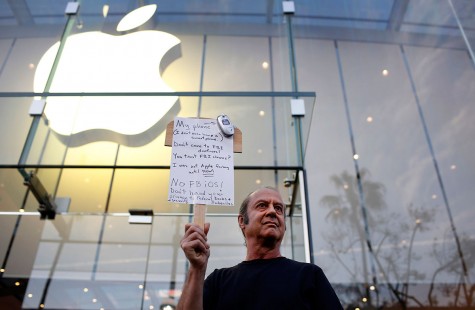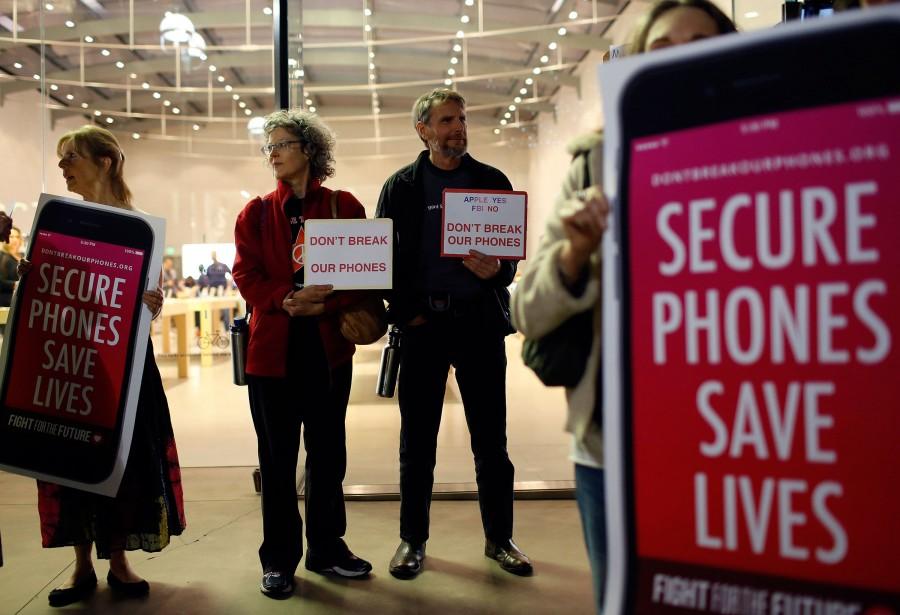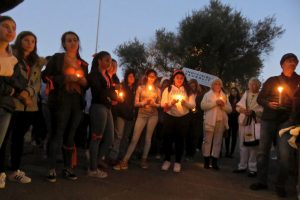Balancing privacy and national security
Protesters, from left, Sandra Bell, Victoria Best, and Charles Fredricks, hold signs in support of Apple store in Santa Monica, Calif., on Tuesday, Feb. 23, 2016.
February 28, 2016
In the wake of the San Bernardino, California massacre, Apple Inc. has promised to resist an FBI court order that could set a new precedent for the

Tom Wolff holds a sign in support of Apple outside of the the Apple store in Santa Monica, Calif., on Tuesday, Feb. 23, 2016. Rallies were planned at Apple stores across the country to support the company’s refusal to help the FBI access the cell phone of a gunman who took part in the killings of 14 people at the Inland Regional Center in San Bernardino.
government’s right to access data in criminal cases, potentially compromising the security of Apple’s iPhone and the privacy of users.
A magistrate judge has signed a court order requiring Apple to write software that would allow the FBI to unlock and investigate the encrypted phone of the San Bernardino shooter, Syed Rizwan Farook, who killed 14 people with Tashfeen Malik on December 2, 2015 before dying during a shootout with police. The request has since been criticized as a “backdoor” to the iPhone 5 that could threaten the security of iPhone users.
While it is important that the government have access to information pertaining to threats to national security, this does not justify their need for backdoor access to cell phone information that isn’t critical.
According to Fortune, Apple will submit its legal brief, detailing reasoning for its resistance, to the judge by February 26, 2016.
“We have great respect for the professionals at the FBI,” wrote Apple chief executive Tim Cook on the Apple website, according to The Washington Post, “and we believe their intentions are good. Up to this point, we have done everything that is both within our power and within the law to help them, but now the U.S. government has asked us for something we simply do not have, and something we consider too dangerous to create. They have asked us to build a backdoor to the iPhone.”
While the FBI director insists that the effects of such an order would be limited to this one case, the results of the struggle between Apple and the government will set a legal precedent for future cases involving privacy and technology, especially if this case makes it to the Supreme Court.
If Apple fails to resist, tech companies likely will be expected to provide backdoors for many of their products—whether it be wearable tech, laptops, programs, or phones. Already, the government can get access to the data collected by many websites as well as phone records, but the scope of the government’s authority to collect this information would increase dramatically.
In a situation like this, where the crime has already been committed and there is no longer an immediate threat, the government should not be able to require an action that would compromise the data and security of iPhone users. The ramifications of creating a backdoor would be great, as such an action not only jeopardizes privacy, but also burdens Apple with a loss of resources as well as consumer confidence in Apple’s products.
For Blanchet students, this means that the results of this legal battle will affect the privacy and security of their phones.
If implemented across all devices, as could be required by a court decision, such a backdoor could seriously compromise security for iPhone users. A permanent backdoor would also make Apple products a weaker target for hackers, who could use the weaknesses of such a system to their advantage.
Thus, the government should not require Apple to create a backdoor, especially because the threat has subsided. If Apple already had the data on the phone, it would be within legal limits to request that the information be handed over as part of the investigation. But since this isn’t the case, Apple should be left alone.
Many companies and public figures are expressing support toward Apple in their fight to maintain privacy. Students should keep an eye on the matter, as the decision will affect future court decisions as well as the government’s interpretation of our rights to privacy and security in regard to modern technology.















